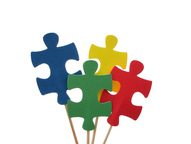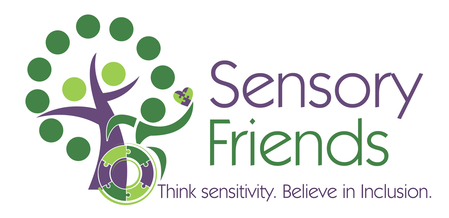
- “I don’t even know if he realizes there is a party going on or that this is fun for him.”
- “She’ll spend more time trying to escape the party and all I’ll be doing is chasing her.”
- “It’s only going to aggravate him, his behaviors will act up and then it will be an unpleasant experience for him, me and the party guests.”
- “We have strict diets and schedules to follow, this will make things more difficult.”
The first thing I want to mention right away to my fellow parents is: Please don’t feel guilty about not throwing or attending a birthday party. We know that we lead a different path from other parents, yet we can’t resist beating ourselves up for thinking we are depriving our children of the traditions we grew up with and wish to uphold. Family traditions and Birthday celebrations are a beautiful thing, and there’s no reason for us to give them up either, we just need to think “different.” I know enough about trial and error with my son when it comes to keeping birthday traditions, and I’ve “blown it” quite a few times. What I've learned is, while traditions are wonderful to keep, the traditional celebratory themes may not appeal to some children. It's hard to think of a birthday celebration as an ordinary day at the pool with the same friends or family members. But if that's what makes your child happy, then it is a wonderful celebration.
Richie had always loved bounce houses and slides. But in recent years, I started to notice that he would leave the bounce house or slide crying and want to go inside the house. Everyone else was having fun, but my son was in the house crying on his birthday. The next year, we ordered the same bounce houses, but decreased the number of attendees to a handful of kids, yet the same reaction happened. Clearly, his interests were changing. These type of parties were no longer fun for him.
Growing up, blowing candles on a birthday cake and singing “Happy Birthday,” was a big deal for my family, it still is. Of course, I was going to do the same thing for Richie. This was fine up until about two years ago, he started getting frustrated and wanted to leave the room as soon as everyone started singing. When it came time to opening gifts, Richie would open them, but I could tell he wasn’t especially excited about the process.
Richie’s birthday is supposed to be all about him enjoying his day. And I had no intention of putting him through another birthday filled with aggravation and tears. Last year, I started to do some research on the topic. I wanted a more direct perspective on celebrating birthdays, so I found some sites that featured online discussion forums for people with autism. I typed “Birthday Parties” in the search box, and what I learned was alarming. I’m not exaggerating when I write that every single post written was about how much they hated and dreaded celebrating their birthday. Examples of what I read were:
· “I hate my birthday. Each year it’s about having a party that makes other people happy. I’m always miserable but no one seems to care. I get in trouble for not having fun, but this isn’t fun for me and no one seems to care.”
· “I have to put on an act for my birthday every year. I learned that the only way to get through this day is to pretend. I’ve become quite the actress.”
· “I never really know how to react to gifts, and I’m sitting in the center of the room forced to open gifts I didn’t ask for or want. Then I’m criticized and punished for not saying the right thing to the gift giver.”
· “Right around my birthday is when I start fantasizing about suicide.”
There were hundreds more like this, I spent hours reading through them. I guess I was looking for one positive post about birthday experiences, but sadly, I found none. I read these posts to my husband with tears in my eyes, admitting that I had made many mistakes, and that we were going to celebrate birthdays very differently. Celebrating birthdays is an important tradition to me, and I still wish to celebrate the day my son blessed my life. But I learned that I need to do it on his terms, and I have to do what he wants. I made some serious changes and this year, it’s going to be different:
1. We’re going to celebrate Richie’s birthday without a party. We are going to his favorite place: Universal Studios, and it will just be our family of six.
2. We will buy his favorite flavored cake and “whisper” happy birthday to him.
3. We will buy him gifts, but we will never make him open them in front of anyone ever again. We will open them privately in his room.
4. He will eat all of his favorite foods, it will be his choice (we use pictures) only. No exceptions.
5. We will watch his favorite movie or show – however many times!
6. We will play his favorite game or activity (swimming, bike riding, bingo, etc.).
A birthday can be celebrated in many ways. Some children do enjoy the social interaction that comes with parties, I learned that Richie doesn’t (he did at one time) – and it’s perfectly okay. It’s always best to include our children in the planning process whenever possible. If your child uses pictures, ask him or her to choose what they’d like to do (Pool, Backyard, Zoo, Museum, Bowling, Theme Park, etc.). Be sure the choices made available are ones you feel are safe and appropriate.
Setting: No matter where you host your celebration, make sure your child has things that are familiar and comforting. Play music he or she likes, bring toys and games they play with often.
Guest List: This is going to depend on your child’s preferences. How does your child do with crowds? What about noise sensitivity? If your child enjoys the company of other kids, then go over the attendee list with him or her and talk to other parents. Try to connect with the parents of your child’s classmates and friends, and educate them on your child’s exceptional needs. Most people are sensitive and genuinely interested in helping children with disabilities. Most parents also want to teach their children about sensitivity and how to be kind to others. If your child doesn’t do well with large crowds, then try to keep the guest list to just intimate family members and one or two people he or she enjoys being around. Remember, this is about your child’s day. Guest lists have a tendency to creep up in numbers. I know this is difficult, but please remember your child’s feelings are more important than the people you’ll offend by not inviting. If they’re good friends, they’ll understand after you’ve explained it to them.
Games: People always wonder what kind of games can be played at a birthday party for children with autism. It’s going to depend on your child’s interests. Please note, that if there isn’t a game your child likes to play, then it’s perfectly okay not make him or her play one. If your child enjoys activities that are sensory related, set up sensory stations (shaving cream table, lights and fidget toys table, etc.) that are favored by your child. This is his or her day, the children you invite will participate in activities your child enjoys – not the other way around.
We already know that parenthood comes with no instruction booklet, and being a parent of a child with a disability comes with even less guidance! So, mistakes might be made, things may go wrong, behaviors may surface, and all we can do is hope that we are carrying out our child’s wishes as best as we can.
As long as we keep our children’s interests, well-being, and happiness in mind, they will lead fulfilling lives filled with memories that highlight our family’s values. We can celebrate our children’s birthday in a limitless number of ways. The best gift we can give to our children on their birthday, is to show them our love by allowing them to celebrate it in the manner they wish. They won’t care about the backyard carnival the neighbors kid had. You’ll be remembered for acknowledging who they are, what they prefer, and how they wish to celebrate. They will forever remember you with love.
© 2015 Sensory Friends

 RSS Feed
RSS Feed